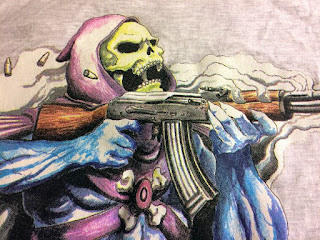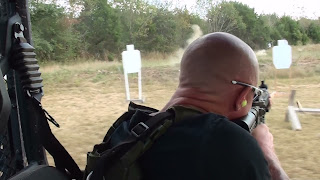I should preface this with the fact that I count many people from every branch and form of law enforcement as some of my closest friends. My career and hobbies attract both police and soldiers to the point that I interact with many on a daily basis. I have nothing but respect for what they do and the sacrifices they have made ensuring rule of law at home and our way of life as a country. I could not do what these heroes do. I am also not referring to specialized units within these groups such as swat and SF units who train to a much higher standard.
A normal conversation I have with someone from the military involves them reciting to me the few passages they were forced to memorize from the M-16A2 field manual (FM3-22.9) by a drill instructor who was walking on their back at the time. "The M-16A2 effective range 500 meters, rate of fire 700 rounds per minute..." and "I qualified as marksman so that means I can hit anything." The truth is that they shoot 40 rounds a year at an eight MOA target at sometimes very limited distances and have all of that scored by their buddy sitting behind them. Hitting 23 out of 40 is a passing score.
Police live in a similar world but it revolves around their sidearm. Being a police officers does not equal shooting prowess. For some their pistol collects lint in the barrel until it is time for their bi-annual qualification, and for them, the test is nothing more than a means to an end. The sidearm is chosen for them by someone who requested a long spongy, 13 lb trigger to prevent accidental discharges or for legal reasons. The holster has level three retention making retrieving it a multi step process. They are also not allowed to pick the caliber or make any modifications to the gun without permission. The pistol for police is, first and foremost, a required piece of gear that makes their back hurt, and is only to be used in the absolute worst case to save their life or another.
For police and military, using ones weapon is associated with the most intense stress and mental trauma humans can experience. The repercussions of this act are lifelong and carry huge legal and administrative penalties.
All this being said, shooters are different people. When shooting is ones passion, bringing your personal skills and equipment to the most effective level possible comes from a completely intrinsic motivation. When a piece of gear does not work or a shot goes off target, shooters will stop at nothing to remedy that. For shooters, trigger pulling is not a means to an end, it is a way of life. Shooters don't think in terms of a programmed eight step sequence to draw ones pistol. Shooting is a fun challenge.
The Navy SEALS's are considered to be among the best shooters in the world. One would think that the only people capable of training them would be other SEALS's. While they do have their own training cadre, when they want to take their shooting skills to the next level, they learn from civilian competition shooters. For long range shooting skills, special operators the world over take courses from a civilian named Todd Hodnett (AKA Sniping Jesus) of Accuracy 1st. For CQB, 'tier one' SF units go to John Shaw's Mid South Institute. John Shaw was a self taught shooter who went on to win or place in virtually every major pistol shooting competition.
The same narrative played out on the show "Top Shot" where normal people who enjoyed shooting in their backyard were pitted against a variety of military and police trained marksman. More often than not, the champion would be a normal guy with a passion for shooting.
When I owned my shooting school, I was often asked how I could train others to shoot effectively if I was never a cop or soldier. I never claim to be the best or fastest shooter, but I do measure my success by being able to make bullets go where I want them to quickly, and I can teach others how to do that as well.
Within the shooting community there are members of the police and military that are shooters. These people will be the first to admit that they are not at all impressed with the shooting skills of their peers. Some even go on to say that they thought they knew how to shoot until they attempted a civilian competition, and were humbled by badly they were beaten.
I feel the best approach is to tap into the strengths each. Contractors, military, and police instructors have skills like small unit tactics, communication, patrolling, using lights and night vision, legal issues, dealing with 'after the fight' psychological issues, medical skills, and a combat mindset. In the civilian world, shooters are free to experiment with highly modified guns, gear, and shooting styles that go on to improve the gun world as well.









No comments:
Post a Comment